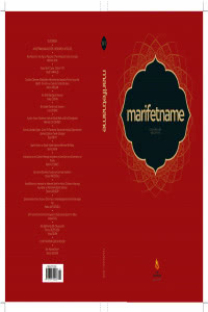THE CATHOLIC CHURCH AND HER DESTRUCTIVE ENEMIES: THE RENAISSANCE, THE REFORMATION, AND THE ABSOLUTE MONARCHS
Before the modernization process, the Church had been shaping the daily life of ordinary people, intervening in important political decisions made by empires and dominating the subjects of the medieval intelligentsia, all at the same time. This article is about the transformation of this supposed “invar-iable” social power of the Catholic Church at the very beginning of the Eu-ropean modernization process. The article aims to present the transforma-tive and staggering effects of the emergence of Renaissance, Reformation and Absolute Monarchies on the power of the Church. The qualitative approach was adopted and the data obtained through accessing primary and secondary sources were subjected to descriptive analysis. The article reveals the follow-ings: In the process beginning with the Renaissance, the fields of thought and culture began to distance themselves from the Church. The Church was not regarded as the sole institution for salvation and eternal happiness anymore and the concept of an intermediary institution between God and individu-als became defunct for almost half of the continent. Over a period of approx-imately 200 years, the kings previously enthroned by the Pope either formed their own churches or declared their independence from the Papacy.
KATOLİK KİLİSESİ VE YIKICI DÜŞMANLARI: RÖNESANS, REFORMASYON VE MUTLAK MONARŞİLER
Modernleşme sürecinden önce Katolik Kilisesi Avrupa’da gündelik yaşamı şekillendiriyor, imparatorlukların aldıkları önemli siyasi kararlara müdahil oluyor, dönemin entelektüel dünyasının konularını belirliyor ve krallara tacını giydiriyordu. Bu makale, Katolik Kilisesi’nin değişmez sanılacak kadar gör-kemli olan bu toplumsal gücünün Avrupa modernleşme sürecinin başlarında yaşadığı dönüşümü konu ediniyor. Makalenin amacı ise, özellikle Rönesans, Reform ve Mutlak Monarşilerin ortaya çıkış sürecinin, Kilise’nin gücünü nasıl sarstığını okuyucuya sunmaktır. Çalışma nitel araştırma yaklaşımını benim-senmiş olup, birincil ve ikincil kaynaklara ulaşarak yapılan literatür taraması ile elde edilen veriler betimsel analize tabii tutulmuştur. Makale şu bilgileri ortaya koymaktadır: Rönesans ile başlayan süreçte düşünce ve kültür alanı yavaşça kendisini Kilise’den ayırmıştır. Kilise artık ruhun kurtuluşu ve sonsuz mutluluk konularında bireylerin sığınacağı tek kurum olmaktan çıkmıştır ve dinden de-ğil ama dinî özgürlük Avrupa halklarının sahip olduğu bir ilke haline gelmiştir. Yaklaşık 200 senelik bir süre zarfında, daha önce papa tarafından taç giydirilen krallar ya kendi kiliselerini kurmuşlardır ya da papadan bağımsızlıklarını ilan etmişlerdir. Kilise üyeleri krallar tarafından yargılanmaya başlanmışlardır.
___
Betts, R. R. “The Influence of Realist Philosophy on Jan Hus and His Predecessors in Bohemia”. The Slavonic and East European Review 29/73 (1951): 402-419.Black, Jeremy. “Warfare, Crisis, and Absolutism”. Early Modern Europe. ed Euan Cameron. New York: Oxford University Press, 1999.
Casanova, José. Public Religions in the Modern World. Chicago and London: The University of Chicago Press, 1994.
Cheney, C. R.- Cheney, Mary G. (Eds). The Letters of Pope Innocent III (1198-1216) concerning England and Wales. Clarendon: Oxford University Press, 1967.
Coates, Willson Havelock - White, Hayden V. - Schapiro, Jacob Salwyn. The Emergence of Liberal Humanism: An Intellectual History of Western Europe. New York: McGraw-Hill Book, 1966
Dackson, Wendy. “Anglicanism and Social Theology”. Anglican theological review94/4 (2012): 615-37.
Dahmus, Joseph Henry. The Middle Ages, A Popular History. Garden City, NY: Doubleday, 1969.
Dresden, Samuel. Humanism in the Renaissance, trans. Margaret King. London: World University Library, 1968.
Jackson, Richard A. “Who Wrote Hincmar’s Ordines?”. Viator 25 (1994), 31-52.
Jordan, William Chester. “Christian Excommunication of the Jews in the Middle Ages: A Restatement of the Issues”. Jewish History 1 (1986), 31-38.
Kumar, Krishan. From Post-Industrial to Post-Modern Society New Theories of the Contemporary World. 2nd ed. Oxford: Blackwell Publishing, 2005.
Lindsay, Thomas M. A History of The Reformation. New York: Charles Scribner’s Sons, 1906.
Maland, David. Europe in the Seventeenth Century. 2nd ed.Hong Kong: Macmil-lan, 1986.
Mann, Nicholas. “The Origins of Humanism”. The Cambridge Companion to Rena-issance Humanism. ed. Jill Kraye. 1-19. Cambridge: Cambridge University Press, 1996
Marenbon, John. Early Medieval Philosophy 480-1150: An Introduction. London and New York, Routledge, 2002.
Martin, C.F.J. An Introduction to Medieval Philosophy. Edinburg: Edinburg Uni-versity Press, 1996.
McGarry, Daniel. Medieval History & Civilization. New York: Macmillan Publis-hing, 1976.
Meyer, Carl S. Luther’s and Zwingli’s Propositions for Debate. Leiden: Brill, 1963.
Meyer, F. W. C. “The Formal Principle of The Reformation”. The Old and New Testament Student, 15/ 1/2 (1892): 31-39.
Parker, Geoffrey. Europe in Crisis 1598-1648. Sussex: The Harvester Press, 1980.
Pavlac, Brian A. “Excommunication and Territorial Politics in High Medieval Tri-er”. Church History 60/1 (1991): 20-36.
Perry, M. et al. Western Civilization. Boston, MA: Houghton Mifflin, 1989.
Peters, Edward. Europe, The World of the Middle Ages. New Jersey: Prentice Hall, Inc., 1977.
Riker, T. W. A Short History of Modern Europe. New York: The Macmillan Com-pany, 1935.
Sharkey, Neil. Saint Gregory the Great’s Concept of Papal Power. Washington: The Catholic University of America, PhD dissertation, 1950.
Schevill, Ferdinand. A History of Europe, From the Reformation to the Present Day. New York: Harcourt, Brace and Company, 1930.
Weber, Eugen. A Modern History of Europe. London: Robert Hale & Company, 1971.
- ISSN: 2148-385X
- Yayın Aralığı: Yılda 2 Sayı
- Başlangıç: 2014
- Yayıncı: Siirt Üniversitesi İlahiyat Fakültesi
Sayıdaki Diğer Makaleler
OLUMSUZLUK VE DEVRİM: ADORNO VE POLİTİK EYLEMCİLİK
العقوبات المالية التعزيرية من زاوية أصول الفقه
تفرُّد الراوي وأثَرهُ في نَكارة الحديثِ في نقد ابن عبد البَر الأندلُسي ت 463 ه
KUR’ANCILIK EKOLÜ’NÜN TÜRKİYE TARİHİNE MÜTEVÂZİ BİR KATKI: KALEM DERGİSİ ÖRNEĞİ
HÛD SÛRESİNİN 111. ÂYETİNİN FARKLI KIRÂATLERİNİN FİLOLOJİK AÇIDAN DEĞERLENDİRİLMESİ
TARİHİ MEZAR TAŞI KİTABELERİNDE AYET, HADİS VE GÜZEL SÖZLERDEN ÖRNEKLER
